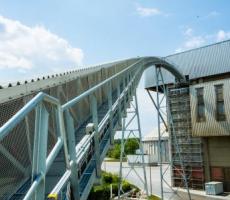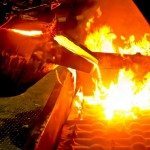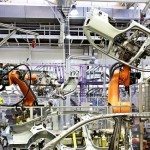Schwenk Zement KG is replacing its old drag chain conveyor line with a modern pipe conveyor from Beumer Group. Requiring a solution that would transport alternative fuels such as crushed plastic material, textiles, and paper from the warehouse to the feeding system of the oven in its cement plant in Bernburg, Germany, this fully closed conveying system makes transporting bulk material more environmentally friendly and energy efficient. Maintenance costs are also considerably lower and the system can be optimally adapted to the ambient conditions.
Schwenk’s product diversity and production capacity make the cement plant in Bernburg one of the largest and most efficient building material plants in Germany. The production of cement along the river Saale has a rich history due to the prevalence of high-quality deposits of limestone in this area. The plant has been in existence since 1960. Schwenk took over the plant in 1990 and tore down the existing systems to build an entirely new plant. Today, Schwenk’s product portfolio includes a wide range of efficient, specialized cement marked by consistently high quality. The company produces the ideal product using modern mixing technology, as required for tunnel, road, and well construction, as well as for geothermal and environment engineering.
One topic of great importance to the Schwenk plant is sustainable production. Production of cement has always been one of the most energy-intensive operations. This is why Schwenk minimizes the use of primary fuels such as coal and oil and focuses increasingly on substitute fuels. These substitute fuels are mainly a mixture of high calorific waste materials, comprised mostly of plastic and packaging residues and textiles. They are processed to high-grade fuels with defined product parameters in external processing plants.
Heat-Intensive Processes
For the manufacturing of cement, limestone is quarried, crushed, and homogenized with additional raw materials. Belt conveyors then transport the crushed material with other materials from the blending bed to the plant. It is ground to the necessary grain size in the raw mills and then dried. The raw meal is then homogenized and temporarily stored in large silos. To obtain Portland cement clinker, a coarse intermediate product, the raw meal is first transported into the cyclone preheater, then into the calcinator, both powered by alternative fuels. The limestone portion of the raw meal is deacidified at temperatures of over 950°C. The material then moves into the rotary kiln where it is burned at temperatures of approximately 1450°C.
Up until now, Schwenk relied on a drag chain conveyor line for transporting the fuels from the storehouse to the feeding systems of its main burner. The baffle plates on these mechanical continuous conveyors are mounted to an endless chain, transporting the bulk material in a trough. “We had been using this system for more than 10 years. This meant that we had to put more and more maintenance work into it,” says Dirk Fabian, production manager at Schwenk in Bernburg.
Another problem was that after further development of the dosing technology, the drag chain conveyor was no longer able to transport enough bulk material, with a density of only 0.2 tn/cu m, to the weigh feeders (and thus to the main burner). “We were looking for an alternative solution that would be ecological as well as low in maintenance,” explained Dirk Fabian. In addition, the new conveyor had to be optimally adapted to the curved routing in the plant.
Read more: Pipe Conveyors Provide Operational Gains, Minimal Disruption, No Material Loss








